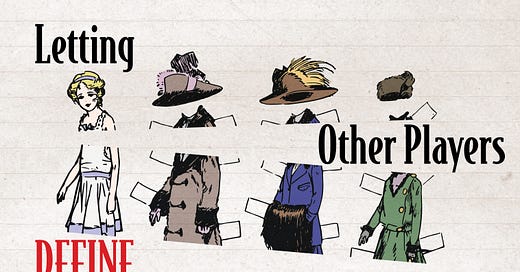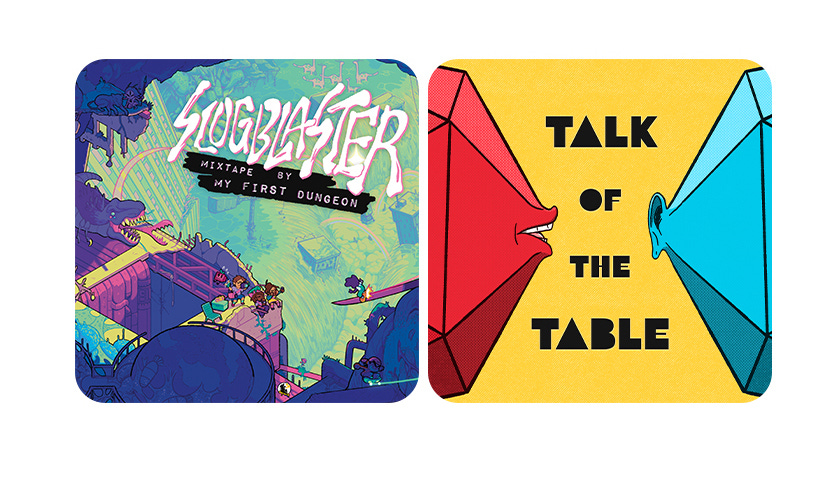Well, well, well, if it isn’t me writing another article about how to make your characters into little baby angel chaos monsters. Creating a character is hard business. Some people love doing the research and background work and have a full set of lore ready and waiting for a character (shoutout to Drakoniques). That always seems so cool to me, but I also find such joy in bringing just the idea of a character and subtly (or not so subtly) letting my fellow players define some of the details for me. If that sounds interesting to you, let me share some of what I’ve learned.
Your Character Is a Winding Road, Not a Straight Path
You can create the coolest, most serious, strong freak of a character who lives in your head as a hot action star. But if your fellow characters decide to roll their eyes at them every time they speak, despite all their accomplishments, that tells you something important. Rather than abandoning your idea altogether or doubling down and being stubborn about how “that’s actually not how they’d treat him,” instead let that choice from the table mold who your character is and what they may have experienced to become this way. Ask yourself why, and let that answer shape the small details of your character and how they interact with the world around them. They can still be a cool freak, but how do they feel about the lack of respect?
The Bare Minimum Opens the Door for Big Impact Moments
What is the bare minimum for character creation, you ask? A name, physical appearance, a couple of defining characteristics, and a one-sentence description of their life story, along with anything else necessary for the game. After that, you can start defining who this character is right at the table. You don’t need to confirm or deny any lore that isn’t pertinent to the game until it comes up. This approach allows you to create a devastating character without trying to force a narrative you already wrote. Instead, you let the story unfold naturally with your tablemates.
Nothing Is Written In Stone
You can change anything about your character at any moment. Of course, if you said something three sessions ago, it may be a little harder to revise, but you can (and should) ask your table for help retconning lore that no longer works for the story. But you can also make these decision on your own. If you decided your character had a tragic secret brother and halfway through the campaign it hasn’t come up and no longer fits, you can totally cut it. Similarly, if you didn’t think your character had siblings but now it would enhance the story, you can absolutely add that. Developing your character doesn’t end once the game starts. You can continue making updates and changes well after session zero.
Good Ideas Can Come From Anyone
Your character is a draft. And like any good draft, the more eyes that review and shape it, the better it can be, as long as everyone is on the same page about the story you’re telling. Look to your GM and fellow players for help. If you say something and another player jumps in with a pitch you like better, you can take that idea. That is exactly how TV, film, and other media are made. Everyone wants to serve the greater good: telling a good story. So never feel like your character or your choices are less valid just because you used someone else’s pitch.
— Shenuque
💸 Coupon Clippings
Use these codes to score deals on some of our most favorite games and keep an eye out for more coupons coming up in future newsletters.
MFD2025 — 20% off anything in the Mythworks Store (Go grab your copy of Slugblaster!)
MFD20 — 20% off Stewpot from Evil Hat Games
MANYSIDED - 20% off anything from moreblueberries.com (excludes pre-orders)
🗞️ News Worthy
The board game company Panda (Wingspan, Root, Gloomhaven) moves production to Brazil amid U.S. tariffs
Twice Rolled Tales releases trailer for an AP of Last Train to Bremen filmed on the New York City Subway.
(Join us in the Many Sided Discord for a screening of Last Train to Brooklyn with the cast and crew Thursday June 19th at 8pET)
Former D&D lead designers Jeremy Crawford and Chris Perkins join Darrington Press
🎲 What We’re Bringing to The Table
🎥 Watch: On High We Go | Dimension 20: Cloudward, Ho!
📚 Read: Rob Donoghue Dissects Daggerheart (Originally on Bluesky, Converted to Blog Post)
🎧 Listen: Party by the Apocalypse
🎙️ New From The Studio
My First Dungeon: Slugblaster | Session Four - Fractures (Thursday June 12th)
Talk of the Table with Asher McClennahan of Kickstarter (Monday June 23rd)
PATREON EXCLUSIVES
My First Dungeon: Slugblaster Talkback (Thursday June 19th)
Talk of the Table: Roundtable | TTRPG Publishing w/ Fred Hicks & Ray Chou (First 30 minutes available free)








Two of my players have leaned into this hard and it was an excellent experience. One player learned that they have a “better in my hands” attitude, would rather stretch herself thin than feel responsible for someone else being upset, and would rather die than be compared to her mother. The other learned they can’t handle they get wasted with a single cup of orange juice alcohol and hate when other people are nice to them.
How did both of them start? A mean girls punk and an assassin disguised as a magical girl.
It's a great insight to allow your fellow players to act as a mirror to your character.
Would you suggest players lean into that perception, or shift their roleplay to get closer to their original vision?